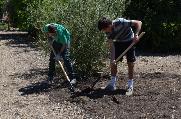Practical Proposal: Gendler Grapevine Fellow
Overview of the project
Camp JCA Shalom, located in Malibu, CA, applied for a Gender Grapevine Project grant to create a Gendler Grapevine Fellowship. The Fellow served as a senior staff member (program director) who oversaw the infusion of Jewish nature and environmental education into all aspects of the Camp JCA Shalom program.
Camp JCA Shalom posted the job description on various job sites (e.g., Jewcology). Below is the job description they distributed.
The Gendler Grapevine Fellow will educate and inspire all Camp JCA Shalom program participants on the connections between Judaism and the environment found in Jewish texts and spiritual practices. The Gendler Grapevine Fellow will teach both campers and staff how to be “Shomrei Adamah,” keepers of the earth, in all aspects of camp life. The Fellow will develop and implement training programs for camp staff during staff training as well as throughout the summer. The Gender Grapevine Fellow will seek also to strengthen and model the Jewish environmental concepts of “Bal Taschit,” not wasting, “Tzaar Ba’alei Hayyim,” ethical treatment of animals, as well as other Jewish environmental values in dining hall practices, bunk programming, specialty areas (i.e., arts & crafts, farm/garden, service projects, horseback riding, ropes course, outdoor adventure, hiking, etc). The Gendler Grapevine Fellow will also supervise the Shemesh Organic Farm program that includes three program specialty staff and their specialty areas: “Pinat” Chai Animal Center (alpacas, goats, sheep, chickens, donkeys, tortoises, rabbits, goats); organic outdoor cooking; organic gardening center; and Israel garden. The Gendler Grapevine Fellow with also work with the Shalom Institute Operations Director to develop more eco-friendly practices at the Shalom Institute (specifically to expand JCA Shalom composting program). As a senior staff member and senior program director, the Gendler Grapevine Fellow will have the best opportunity to have a tremendous impact on the program of Camp JCA Shalom and ecological practices of the Shalom Institute as well as a lasting impact on all the Camp JCA Shalom staff and campers. To maximize this impact, the Gendler Grapevine Fellow will develop ways both to continue this impact beyond the summer and to track the impact on both campers and staff throughout the year.
In the first year, the Fellow created new all-camp programs such as Earth Day; expanded their environmental educational programming in the farm, outdoor cooking, and animal center programs; and worked with the unit heads to integrate Jewish environmental education into their unit and cabin programming. His focus was on teaching concepts such as Shomrei Adamah, Bal Taschit, and Tsarei Baalei Hayyim along with Jewish agricultural laws and holidays. The camp administration was impressed that the Fellow could garner significant support from the Camp JCA Shalom staff in such a short time, which they note is not easy when implementing new programming and changing attitudes.
At the end of the summer, the Fellow provided the camp with an environmental assessment, a list of programmatic suggestions for summer 2014 and beyond, and organized all of the Jewish environmental education programs on the camp’s server.
Information about the program and the camp’s efforts to highlight connections between Judaism and the environment was conveyed to families primarily through communication from the camp director. Although too late to implement for summer 2013, the Fellow developed new ideas to communicate and educate the families and campers prior to arriving for summer (e.g., the packing list, an environmental camper covenant – “brit”), which they plan to implement for summer 2014.
Lessons learned and suggestions for those wanting to replicate the project:
* Set realistic expectations for what can be accomplished, especially in the inaugural summer. It can be hard for a new staff member to come into an existing camp culture and make significant change in one summer. It takes time to understand the camp culture and systems. Making the correct staffing choice, like they were able to do at Camp JCA Shalom, helped ease this transition and allowed them to make significant change and impact in a short amount of time.
* If possible, hire someone who is interested in this position for more than one summer and who has prior experience at the camp. However, to find the background and skills for this very specific position, it may be necessary to hire someone from the outside and only for one summer. With this in mind, they suggest that camps think about tailoring the expectations to provide greater support to the Fellow.
* While you can accurately project the budget needed to support the salary of the Fellow, expect to have unanticipated expenses resulting from the ideas and projects generated by the new focus on the environment. The Gendler Grapevine Fellow provided new ideas for facility “green” improvements, developed new programming that were integrated into the daily program of Camp JCA Shalom specialty areas, and organized special events like Earth Day, which required more resources of both time and money.
* Make sure to find the person who has both the Jewish and environmental background, but the personality and ability to garner support for the changes that will be made.
* Provide high expectations in terms of the job description, but also create realistic goals that will realize success in the first summer.
* Create a multi-year strategy (i.e., strategic plan) for Jewish environmental programming at the camp.


